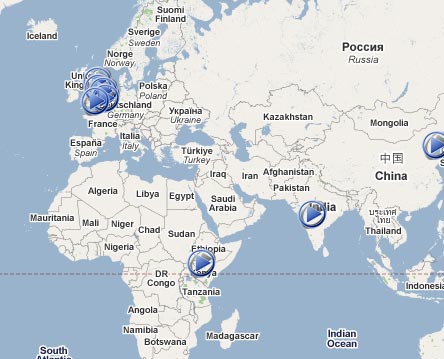Journalism.co.uk’s office – and me – got an appearance on Al Jazeera English this week. The media show Listening Post looked at the issue of online anonymity as part of today’s programme. It also featured Ian Reeves from the Centre of Journalism at the University of Kent, blogger Gaurav Mishra and Andrew Ford Lyons from the Committee to Protect Bloggers. It looked at the recent Liskula Cohen case in New York, Times v NightJack in the UK, and raised multiple questions about the practicalities – and future – of blogging without a byline.
Tag Archives: Ian Reeves
Right of a blogger’s anonymity: a selection of views
Since this week’s ruling that NightJack, winner of the Orwell Prize’s first political blogging award, could not remain anonymous was announced – summed up by Paul Bradshaw here – bloggers, commentators and commenters have typed furiously (a few the links at the end of this post). Has the Times been hypocritical? What are the implications for those working and writing about life in the public sector? Should one be able to protect one’s identity as a blogger… or journalist?
The only thing Journalism.co.uk will add is this insight into the Times’ investigative process of the case, as provided by the Times:
“The action arose after Patrick Foster, a Times journalist, identified the NightJack blogger ‘by a process of deduction and detective work, mainly using information on the internet,’ the judge said.”
“Mr Horton was adamant that he had taken great pains to keep his identity secret. But on his blog, he also described his visits to a jiu-jitsu club, adding a hyperlink to the website of the organising body for the martial art. Lancashire Constabulary jiu-jitsu club lists only one member who is a detective – Detective Constable Richard Horton.”
Some of the wider discussion:
- Enemies of Reason: ‘Where did I put that cloak of anonymity?’
- Zoe Margolis: ‘Privacy‘
- Ian Reeves: ‘Night Jack: the end of the anonymous blogger?’
- Richard Horton, the Times: ‘My Everyman posts seemed to strike a chord’
- Random Acts of Reality (aka Tom Reynolds): ‘Notes on NightJack’
- Gary Andrews: ‘NightJacking anonymity’
- Gawker: ‘You don’t have the right to anonymity’
Finally, Horton’s Orwell Prize win as reported by Journalism.co.uk in April 2009:
“Anonymous blogger ‘Jack Night’ took the award in the blogging category, for his site NightJack. In a speech made on his behalf, Jack said the last year had seen blogging become a more important part of the political reporting world. The blogger, who ended his posting after being shortlisted for the award, donated his prize to the Police Dependants’ Trust.”
Newspaper videojournalism – mapped
 Courtesy of Ian Reeves and Kent University’s Centre for Journalism comes a map plotting newspaper video experiences and experiments across the world.
Courtesy of Ian Reeves and Kent University’s Centre for Journalism comes a map plotting newspaper video experiences and experiments across the world.
The map is intended as a place for journalists and publishers to share tips and examples of ‘best practice’ in newspaper video journalism and can be contributed to at this link.
Online Journalism Scandinavia: Norway’s Journalisten – a role model for UK journalism trade titles?
Kristine Lowe asks, is there a business model in covering the media for the media?:
(Disclaimer: Kristine works part-time for the Norwegian journalism magazine and website Journalisten and has previously contributed to Press Gazette and NA24 Propaganda)
Recording the miserable state of our industry, and listening to experts predicting its imminent death, is a daily plight for media hacks in the western hemisphere.
Newspaper readership for one seems to be in perpetual decline, a fact often bemoaned by the media columnist.
However, a recent article in MediaGuardian by former Press Gazette editor Ian Reeves suggests that the UK’s journalism trade titles, such as the National Union of Journalists’ (NUJ) The Journalist magazine and Press Gazette, are faced with an audience of hacks, who have lost the appetite for news about their own.
“You’ll never make money out of journalists,” Reeves quotes Haymarket’s Michael Heseltine as saying.
Yet that is exactly what the Norwegian equivalent of The Journalist does.
Journalisten.no recorded £1.4 million in revenues in 2007, despite competition from Kampanje (Campaign) – a trade magazine that also covers PR and marketing; NA24 Propaganda – a dedicated media news site; and the media sections of national and regional newspapers.
Roughly £800,000 of this came from advertising and £300,000 from subscriptions, leaving the magazine and news site, which are published by The Norwegian Union of Journalists (NJ), with a post-tax profit of £104,000.
Hardly enough for the hardened business world, but more than enough to justify the existence and further expansion of a ‘local newspaper’ for the country’s journalists.
The news site had 11,000 unique Norwegian-based visitors last week, while the main benefactors of the bi-weekly magazine are around 10,000 union members, who receive it as part of their union membership.
Other than union members, the magazine does have about 1,000 subscribers in the corporate and NGO sector, but not much has been done to market it to a broader audience recently.
The key to Journalisten’s revenues has been capturing the job classifieds market for media jobs, which is easier said than done in a more fragmented market such as the UK. Another minor stream of revenue for Journalisten is a database of PR contacts.
But Journalisten is hardly an isolated example: US-based media site Mediabistro, which also earns money from freelance listings, membership fees and training, must have had a decent turnover to have made it a worthwhile acquisition for Jupiter Media.
Swedish Résumé, owned by Swedish media giant Bonnier, is another contender with 15,000 unique visitors per day online and 29,000 readers per week for its magazine.
These are just two examples which spring to mind here and now, does anybody have other suggestions?